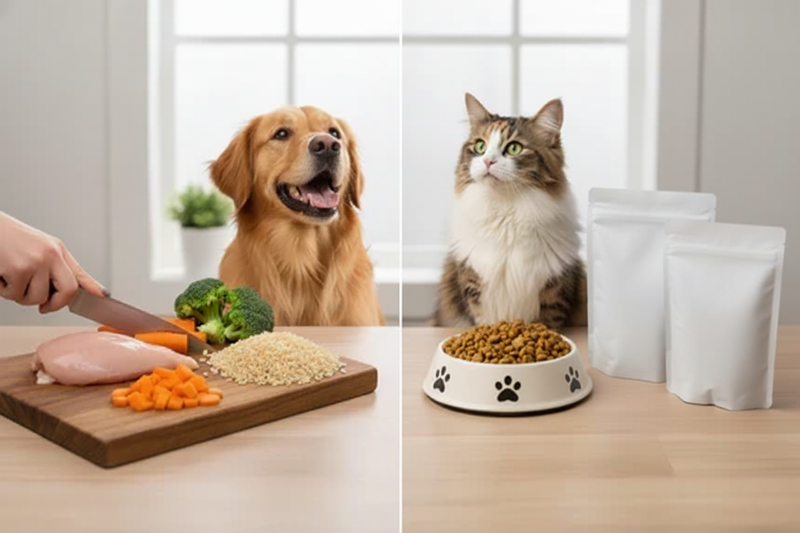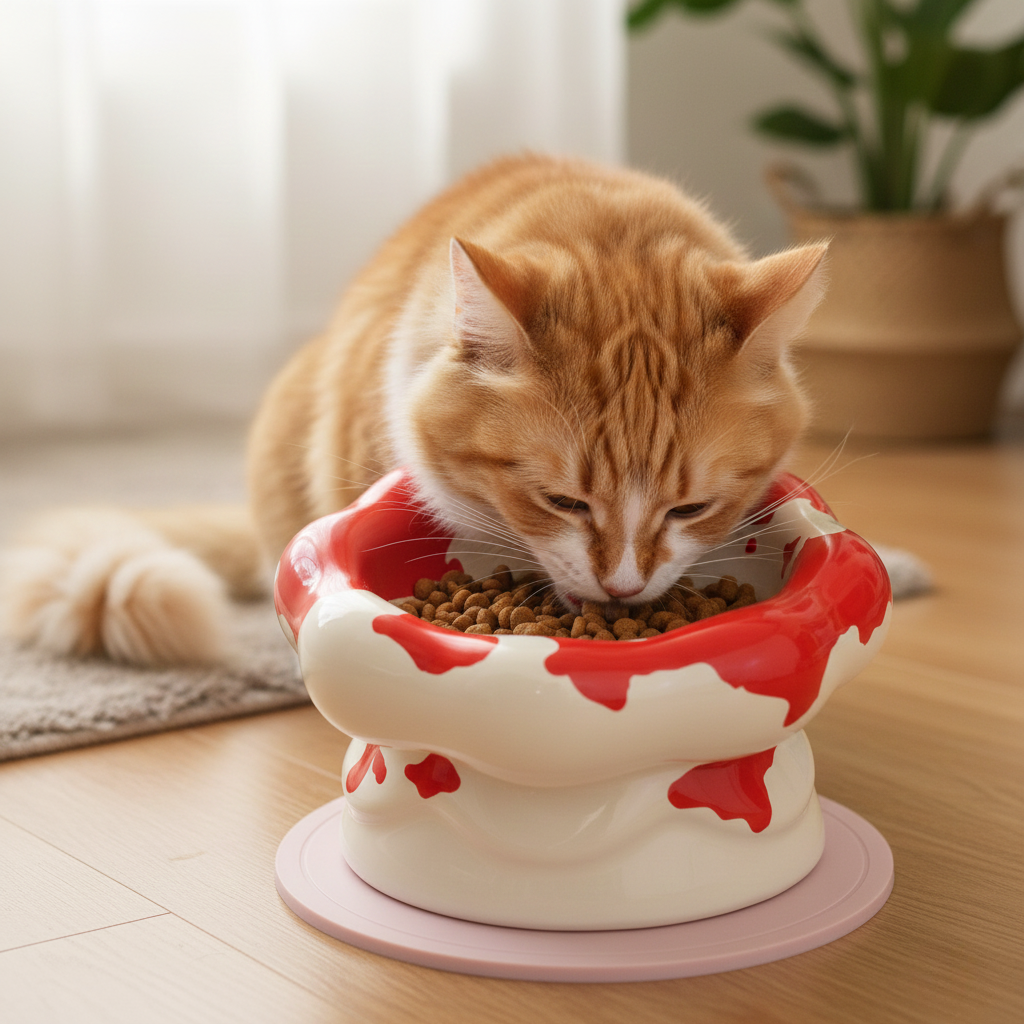Choosing between homemade and commercial pet food is a crucial decision for any pet parent. This guide explores their strengths and weaknesses, offering expert insights to support your pet’s health and happiness.
Key Takeaways
- Commercial pet food offers guaranteed balanced nutrition, convenience, and regulated safety standards.
- Homemade diets provide full control and customization but demand veterinary guidance to avoid nutrient deficiencies and safety risks.
- Ingredient transparency is clearer in homemade food, though choosing reputable commercial brands helps ensure quality.
- Both options can be adapted for allergies and special health needs, with a hybrid feeding approach also possible under expert supervision.
- Regular veterinary involvement is essential, regardless of diet choice, to maintain your pet’s long-term well-being.
Table of Contents
- 1. Nutritional Adequacy: The Foundation of Pet Health
- 2. Ingredient Transparency: Knowing What’s in Your Pet’s Food
- 3. Safety Considerations: Protecting Pets from Harmful Ingredients and Contaminants
- 4. Customization of Pet Diets: Tailoring Nutrition to Individual Needs
- 5. Convenience: Practicality in Everyday Feeding
- 6. Veterinary Guidance: The Essential Partner in Pet Nutrition
- 7. Allergies and Sensitivities: Managing Challenging Diets
- 8. Final Thoughts: Choosing the Best Diet for Your Pet
- FAQ
1. Nutritional Adequacy: The Foundation of Pet Health
Proper nutrition ensures your pet receives the right balance of proteins, fats, vitamins, and minerals needed for growth, immune function, and overall vitality. Without it, health problems can arise.
Commercial Pet Foods: Formulated for Balanced Nutrition
Commercial pet foods designated as “complete and balanced” comply with the AAFCO guidelines, ensuring essential nutrients suited for all life stages. They:
- Guarantee nutrient balance through validated formulas
- Offer specialized diets addressing allergies, kidney health, and weight management
- Provide unmatched convenience with no preparation needed
Homemade Pet Food: Control Comes with Responsibility
While creating meals at home allows ingredient control, studies such as one by UC Davis reveal that most homemade recipes suffer from nutrient deficiencies, risking skeletal, immune, or metabolic disorders. Both under- and over-supplementing vitamins and minerals can harm your pet.
"Consulting a veterinary nutritionist is critical when preparing homemade diets to ensure safety and completeness."
2. Ingredient Transparency: Knowing What’s in Your Pet’s Food
Understanding ingredients supports managing allergies and sensitivities effectively.
Homemade Food: Clear and Customizable
With homemade meals, you have full visibility and control over every ingredient, avoiding harmful additives or allergens. This peace of mind benefits pets with specific sensitivities.
Commercial Food: Not Always Straightforward
Labels on commercial foods can be confusing, with vague terms like “meat by-products” or “natural flavors.” Even though high-quality brands are more transparent, ingredients such as fillers, dyes, or preservatives can still cause unwanted reactions in sensitive pets.
- Terms like “natural” lack legal definition and can mislead
- Additives are regulated for safety but some owners prefer to avoid them
Choosing trustworthy brands with detailed labeling can ease concerns if homemade options aren’t feasible.
3. Safety Considerations: Protecting Pets from Harmful Ingredients and Contaminants
Safety is paramount. Both food types pose risks without proper care.
Commercial Pet Food: Regulated But Still Vulnerable
Commercial foods are subject to federal oversight by the FDA, yet recalls for issues like salmonella or vitamin D toxicity occasionally occur. These events highlight ongoing vigilance needs.
Homemade Food: Preparation and Knowledge Are Key
Homemade diets face contamination risks if raw or improperly cooked, and accidental inclusion of toxic foods such as onions or chocolate is possible.
- Nutrient imbalances due to lack of recipe expertise
- Improper hygiene raising chances of bacterial contamination
- Cooking errors impacting nutrient availability or causing toxicity
Best Practices:
- Partner with a veterinary nutritionist for homemade formulations
- Maintain strict hygiene and storage routines
- Monitor FDA alerts for commercial food recalls
4. Customization of Pet Diets: Tailoring Nutrition to Individual Needs
Each pet requires a unique diet adapted by age, breed, health, and preferences.
Homemade Diets: Precision and Flexibility
Homemade meals allow you to:
- Exclude allergens completely
- Adjust calorie intake for weight regulation
- Incorporate supplements like omega-3 fatty acids
- Address unique medical conditions accurately
Commercial Diets: Designed for Common Scenarios
Commercial brands offer:
- Limited-ingredient options for allergies
- Renal and breed-specific diets
- Life stage-specific formulas
However, they may not always satisfy complex nutritional needs fully.
A Hybrid Approach: Mixing premium commercial and homemade foods under veterinary supervision may enhance taste, variety, and dietary compliance.
5. Convenience: Practicality in Everyday Feeding
Feeding should be sustainable for your lifestyle.
Commercial Pet Food: Hassle-Free and Widely Accessible
- No preparation necessary—just serve
- Budget-friendly with widespread availability
- Long shelf life and easy storage
- Accessible both in-store and online
Ideal for busy families or homes with multiple pets.
Homemade Pet Food: Time, Effort, and Planning
- Shop, prepare, cook, and store meals regularly
- Usually more costly, especially with high-quality ingredients
- Requires ongoing commitment to maintain balance
Homemade feeding demands time and dedication but can be rewarding for invested pet parents.
6. Veterinary Guidance: The Essential Partner in Pet Nutrition
Veterinarians play a central role in safe and effective feeding.
- Homemade diets: Require consultation with board-certified veterinary nutritionists for recipe creation and follow-up.
- Commercial diets: Vets assist in selecting suitable brands and adjusting diets as pets age or develop health conditions.
Regular vet visits help keep your pet’s diet aligned with their evolving health needs.
7. Allergies and Sensitivities: Managing Challenging Diets
Diet management is critical for pets with food sensitivities.
Homemade Diets: Pinpoint Ingredient Control
- Eliminate known allergens with precision
- Avoid preservatives, fillers, and dyes that may trigger reactions
Commercial Diets: Specially Formulated Solutions
- Offer hypoallergenic and limited-ingredient varieties
- Use novel proteins such as duck or venison to reduce allergic responses
- Require gradual transitions and monitoring
Always consult your veterinarian when addressing allergic diets to avoid inadvertent exposure to allergens.
8. Final Thoughts: Choosing the Best Diet for Your Pet
There’s no one-size-fits-all answer. Your ideal choice depends on your pet's health, your lifestyle, and your willingness to engage in diet preparation and monitoring.
- Commercial food offers reliable, balanced nutrition with ease of use.
- Homemade diets deliver maximum control but demand expert oversight and dedication.
- A balanced mix combining both approaches can optimize benefits with veterinary guidance.
Remember: Ongoing veterinary care, education, and attentiveness are the keys to supporting your pet’s health for years to come.
For premium pet products and expert advice, visit Petocart, your trusted source for everything pets.
FAQ
Q1: Is homemade pet food nutritionally complete?
Homemade pet food can be complete but usually requires expert formulation by a veterinary nutritionist to avoid nutrient deficiencies or excesses.
Q2: Are commercial pet foods safe?
Commercial pet foods undergo federal safety regulations and testing, but occasional recalls for contamination or imbalances highlight the importance of selecting reputable brands and staying informed.
Q3: How can I manage my pet’s food allergies?
Consult your veterinarian to identify allergens. Homemade diets allow precise elimination, whereas commercial hypoallergenic or limited-ingredient formulas offer convenient alternatives.
Q4: Can I mix homemade and commercial foods?
Yes, combining high-quality commercial food with homemade ingredients under veterinary supervision can enhance diet variety and palatability.
Q5: How often should I consult my veterinarian about my pet’s diet?
Regular check-ins are recommended, especially when switching foods, managing health conditions, or changing life stages to ensure dietary needs are met optimally.








